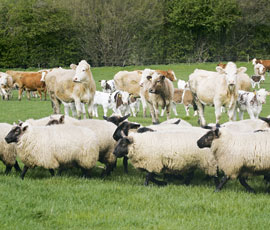Consumers hold key for beef and sheep farmers

Challenge the status quo, understand your customer and manage your business with a view to the removal of single farm payment – only then will livestock producers be able to benefit from new and existing markets.
That was the take-home message from the recent NFU Future of Livestock Farming Event, at Stoneleigh Park, where the next generation of producers gathered to hear how their business could be best shaped for the future.
“There is no bigger opportunity than what is in front of you now,” said HSBC’s head of agriculture Allan Wilkinson.
However, he said there was huge scope to improve business efficiencies. “I see very mixed results in agriculture. You should use today as a platform to make sure you are the best in class, but to do that, you need to be the best business manager there is.”
Speakers urged delegates to focus on the needs of the customer, both at home and abroad.
David Hughes, emeritus professor of food marketing at Imperial College London, said UK farmers needed to get better at “selling the sizzle not the steak”.
“Beef and lamb is double the price of pork and other meats, but why would the consumer pay double? It’s taste, tenderness and the story behind it – Who is the hero/heroine? Is it the heritage, region or production process?”
Only by formulating a story could premium prices be earned and export markets be exploited. However, it was crucial to understand the requirements of emerging international markets to target their specific needs.
Mr Wilkinson also stressed the need to critique the structure of livestock businesses with the view to reduced or zero farm support in the future.
Citing three profitable businesses who were either farming without SFP, serving the local marketplace or exploiting international opportunities, he said all these businesses had several criteria in common.
“They know their business inside out, benchmark ruthlessly, are open to change and have technical brilliance, allowing them to produce as much product as possible at as little cost as possible.
“Each one of you in this room could achieve the same – it’s about aptitude.”
Better genetics reduce emissions
Failure to select for top genetics could be compromising beef and sheep producers’ ability to maximise production and reduce greenhouse gas emissions.
According to Charles Warkup, director of Biosciences KTN, the beef and sheep industries are significantly behind the poultry and dairy sectors.
“There has been a poorer uptake of improved stock by beef and sheep farmers,” he said.
“Where layers and broilers have knocked a lot off their global warming potential (GWP100) through genetic improvement, sheep have only reduced their GWP by 1% emission/tonne over the last 20 years.”
The beef industry was even further behind, with zero reduction in emissions a tonne through genetic improvement between 1988 and 2007. Comparably, layers had reduced emissions through breeding by 25%/t and dairy by 16%/t.
However, Mr Warkup explained that sheep farmers could have made greater strides towards reducing their GWP if they had selected for better genetics.
“If every ram across the country was an average ram from a performance recorded breeder, the GWP would have reduced by 8% over the last 20 years, versus the actual 1% seen.”
Mr Warkup stressed that using performance recorded animals was a “win win” for producers. “These animals do better, grow faster are more prolific and have a better carcass. And everyone gets the environmental benefit,” he said.
